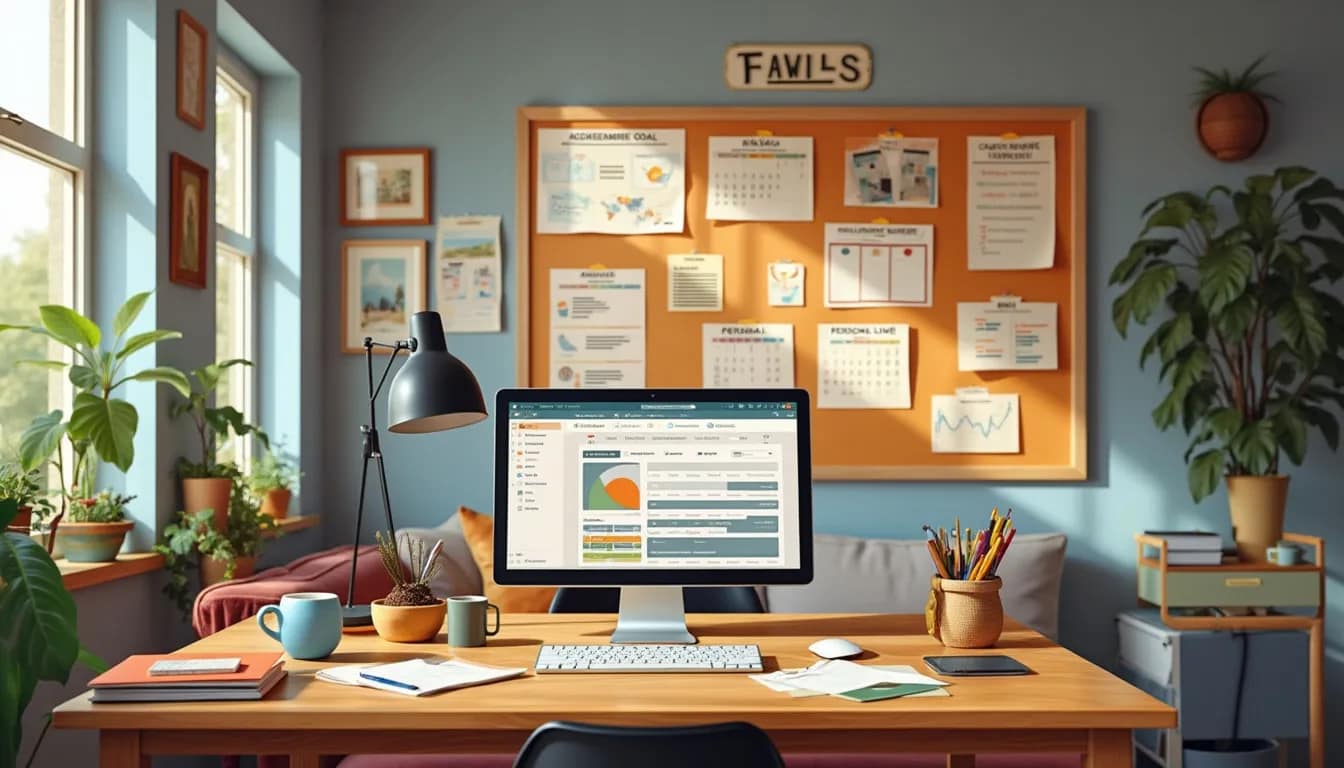In today’s fast-paced world, maintaining a healthy work-life balance is more crucial than ever. Understanding the importance of balancing our professional and personal lives begins with recognizing its profound impact on our overall well-being. When work takes over, it can lead to heightened stress levels and burnout, affecting both our physical health and mental clarity.
Recent statistics illuminate the growing need for a harmonious work-life balance. Surveys indicate that nearly 60% of employees feel overworked, and almost 30% have noticed an imbalance affecting their job performance. These figures underscore the deep-rooted necessity for mindful management of our time and energy. Poor work-life balance not only saps our motivation but can also give rise to chronic conditions such as anxiety, depression, and cardiovascular problems.
This article embarks on a journey to provide you with practical self-care tips for achieving and maintaining a balanced life. You will learn how to set clear boundaries between work and personal time, harness the power of mindfulness and meditation to reduce stress, and employ effective time management strategies to enhance productivity. Physical activity and nutrition also play critical roles, ensuring your body stays as balanced as your mind.
We will delve into long-term strategies that prioritize realistic goal-setting, regular self-assessment, and adjustments. Seeking support from professionals, community resources, and peer networks can reinforce your efforts. Ultimately, integrating self-care into your daily routine will nurture a sustainable work-life balance.
Join us as we explore how mindfully managing work-life balance can transform your life, empowering you to thrive in both your personal and professional realms.
Understanding the Importance of Work-Life Balance
Work-life balance is a term that might sound simple but holds profound significance. At its core, work-life balance is the equilibrium between professional responsibilities and personal life. This balance is essential to ensure that neither aspect overwhelms the other, allowing us to lead a fulfilling life. When properly managed, work-life balance nurtures both our mental and physical well-being, which in turn positively influences our productivity, relationships, and overall happiness.
Definition and Significance of Work-Life Balance
Work-life balance refers to the healthy integration of work obligations with personal time. It’s not about dividing hours equally between professional and personal tasks, but about creating an environment where one enriches the other. Achieving this balance means giving due attention to family, hobbies, health, and rest, while also being productive at work.
A balanced work-life scenario fosters creativity, prevents burnout, and enhances job satisfaction. Conversely, neglecting this balance can lead to increased stress levels, strained relationships, decreased productivity, and a host of health issues.
Statistics and Facts Highlighting the Need for Maintaining Work-Life Balance
- According to the American Psychological Association, two-thirds of workers feel that job stress significantly impacts their mental health.
- Research by the Global Organization for Stress reports that 75% of employees believe their job is more stressful than it was a generation ago.
- The Harvard Business Review highlights that companies where employees report high stress levels demonstrate 50% more voluntary turnover.
These statistics emphasize that maintaining a healthy work-life balance is crucial not only for individual well-being but also for organizational success. Chronic stress and imbalance can lead to reduced work efficiency and higher costs associated with employee turnover and health care.
Psychological and Physical Implications of Poor Work-Life Balance
When work-life balance falters, the impacts can manifest both psychologically and physically. Our minds and bodies are deeply interconnected, and chronic stress from an imbalanced lifestyle can trigger a cascade of adverse effects.
Mental health deteriorates with prolonged exposure to stress, leading to issues such as anxiety, depression, and burnout. These conditions can affect one’s ability to concentrate, make decisions, and relate to others positively. Additionally, stress can erode self-esteem and diminish the quality of personal relationships, fueling a cycle of negativity and dissatisfaction.
Physically, chronic stress elevates cortisol levels, contributing to several health problems. This includes cardiovascular diseases, digestive issues, migraines, and a weakened immune system. Moreover, individuals experiencing poor work-life balance often adopt unhealthy lifestyle habits, such as poor diet choices, lack of exercise, and insufficient sleep, further exacerbating health problems.
Interactive Self-Reflection Exercise: Take a moment right now to assess your current work-life balance. On a scale of 1 to 10, how would you rate your balance between work responsibilities and personal life? Note down any immediate feelings or thoughts that arise from this reflection, as they can provide valuable insights into your current state and areas that may need attention.
Understanding the critical importance of work-life balance helps us prioritize making necessary changes. By being mindful of our own needs and the delicate equilibrium between work and personal life, we can take the first steps toward a more balanced and fulfilling existence.
Personal Testimonial
Jessica’s Story: I used to think that working longer hours and multitasking were marks of dedication and success. However, it wasn’t long before the relentless grind took its toll. I was constantly fatigued, missing family events, and my mental health was deteriorating. After seeking help and reassessing my priorities, I realized that true success lies in balancing work with self-care. Through mindfulness practices and setting clear boundaries, my quality of life improved dramatically. Not only did my productivity increase, but I also felt a renewed sense of joy in both my personal and professional life.
The journey towards a balanced work-life dynamic requires consistent effort and awareness. By appreciating its significance and recognizing the symptoms of imbalance, we can take proactive steps to cultivate a healthier, more harmonious lifestyle.
Practical Self-Care Tips for Achieving Work-Life Balance
Finding harmony between work and personal life often feels elusive in our fast-paced world. However, through mindful practices, we can cultivate a balanced lifestyle. Below are practical self-care tips designed to support you in achieving a manageable and fulfilling work-life balance.
Establishing Boundaries Between Work and Personal Life
One of the most straightforward yet profound changes you can make is to set clear boundaries between work and personal time. According to a study by the American Psychological Association, employees who set firm boundaries reported higher levels of life satisfaction and lower levels of stress.
Try creating a designated workspace at home and define specific working hours. Once those hours are over, give yourself permission to disconnect from work emails and notifications. Remember, your downtime is essential for recharging and maintaining overall well-being.
The Role of Mindfulness and Meditation in Reducing Stress
Integrating mindfulness and meditation into your daily routine can significantly alleviate stress and improve your focus. Research by the National Institutes of Health suggests that regular mindfulness practices can lower cortisol levels, the hormone associated with stress.
For a simple exercise, try the Five-Minute Breathing Meditation. Find a quiet space, sit comfortably, and focus on your breath. Inhale deeply, hold for a moment, then exhale slowly. Repeat this cycle, allowing your mind to release thoughts and feelings, gradually bringing you to a state of calm.
Time Management Strategies and Tools for Better Productivity
Effective time management is crucial for balancing work and personal commitments. Tools like the Todoist and the Pomodoro Technique can help you streamline tasks and maintain focus.
Begin by organizing your workday with a clear plan. Prioritize tasks and set realistic deadlines. The Pomodoro Technique (working in intervals of 25 minutes followed by a short break) can enhance productivity and prevent burnout. Remember to include time for breaks and personal activities to maintain equilibrium.
The Importance of Regular Physical Activity and a Balanced Diet
Our physical health directly influences our ability to handle stress and maintain productivity. According to the World Health Organization, engaging in at least 30 minutes of moderate physical activity most days can enhance mood and energy levels.
Incorporate regular exercise into your routine, whether a morning jog, a yoga session, or a relaxing walk. Consistent physical activity can boost your endorphins and offer a refreshing break from work-related pressures.
A balanced diet also plays a pivotal role in supporting mental and physical health. Aim for a diet rich in fruits, vegetables, whole grains, and lean proteins. These nutrients can stabilize your energy levels and improve overall cognitive function, making it easier to manage daily tasks.
To track your dietary habits, consider using apps like MyFitnessPal. These tools offer personalized recommendations and can help you stay mindful of your nutritional intake.
Interactive Reflection
Take a moment now to reflect on these tips. Consider jotting down your current work-life habits and identifying areas needing improvement. What steps can you take today to start making a positive change?
Remember, each small step contributes to a greater sense of balance and well-being. By implementing these practical tips, you can create a more harmonious and fulfilling life.
Long-term Strategies for Sustaining Work-Life Balance
Setting Realistic Goals and Expectations
One of the most crucial elements in sustaining work-life balance is setting realistic goals and expectations. It’s easy to fall into the trap of overcommitting, but this often leads to burnout. Begin with small, manageable steps. Reflect on what truly matters to you and prioritize those aspects. Remember, it’s okay to say no to additional responsibilities that could disrupt your balance.
For example, consider setting a goal to leave work by a specific time each day. This boundary not only aids in managing your work hours but also ensures you dedicate time to personal activities and relationships. It’s important to align these goals with your personal values and current life circumstances.
Importance of Regular Self-Assessment and Adjustments
Regular self-assessments are essential for understanding your needs and adjusting your habits. Checking in with yourself on a weekly or monthly basis helps you stay mindful of any imbalances and take corrective action. Create a simple checklist or journal entry to evaluate:
- How you’re feeling emotionally and physically
- Whether you’re spending enough time on activities that bring joy
- If work demands are starting to feel overwhelming
This practice not only offers insight into your current state but also helps you develop a plan for adjustments. Maybe you need to renegotiate deadlines, delegate tasks, or find new ways to integrate relaxation into your routine.
Seeking Support: Professional Help, Community Resources, and Peer Support Networks
It’s important to acknowledge that sustaining work-life balance isn’t always a solo journey. Support systems play a critical role. Don’t hesitate to seek professional help, such as a counselor or a life coach, who can provide tailored strategies for managing stress and time. Community resources such as local workshops on mindfulness and work-life balance can also be incredibly beneficial.
Peer support networks offer another layer of assistance. Sharing your experiences with others who face similar challenges can be incredibly relieving, and you may learn new tips and strategies. Whether it’s a formal group or just a circle of friends, the sense of community can provide motivational support to keep you on track.
Developing a Sustainable Routine: Integrating Self-Care into Daily Habits
Creating a sustainable routine is vital for maintaining long-term work-life balance. This involves integrating self-care into your daily habits so that it becomes second nature. Start by identifying small, consistent actions that you can incorporate into your daily life. Here are a few ideas:
- Morning mindfulness practice: Begin your day with a few minutes of meditation or deep breathing to set a calm tone for your day.
- Mindful eating: Taking the time to enjoy your meals without distractions can enhance your overall well-being.
- Mindful pauses: Set an alarm every hour to remind yourself to take a short break, stretch, or simply look away from the screen to rest your eyes.
Envision your daily routine as a balanced flow rather than a series of rigid tasks. Flexibility is key. Acknowledge that some days will inevitably be busier than others and adjust accordingly. By building a routine that adapts to your needs, you create a sustainable balance that nurtures your mind, body, and spirit.
***What kind of self-care activities do you find most helpful?*** Reflecting on this can help you tailor your routine to best meet your unique needs.
In conclusion, managing work-life balance mindfully is a key pillar in nurturing our overall well-being. It is not merely about juggling responsibilities but finding a harmonious blend where both professional and personal life thrive. Adopting practical self-care tips such as establishing clear boundaries, practicing mindfulness, managing time efficiently, and maintaining physical health can significantly enhance your daily experience. By striving for realistic goals, regularly reassessing your strategies, and seeking support when needed, you pave the way for a sustainable and enriching work-life balance.
Remember, integrating mindfulness into your daily routine is a powerful tool to mitigate stress and foster a calmer mindset. Allow yourself the grace to be flexible and adjust your approach as needed. Every small step you take toward balancing your life is a testament to your commitment to self-care and personal growth. Let the stories and tips shared here encourage you to create a fulfilling, balanced life that serves your mind, body, and spirit. You deserve to live a life where both work and personal time are not only managed but also enjoyed.
Take a moment now to reflect on how you might apply these insights to your own life. What small change can you implement today that will lead you closer to that balance you seek? Your journey to a mindful and balanced life starts now, with small, intentional steps and a nurturing, supportive mindset.



